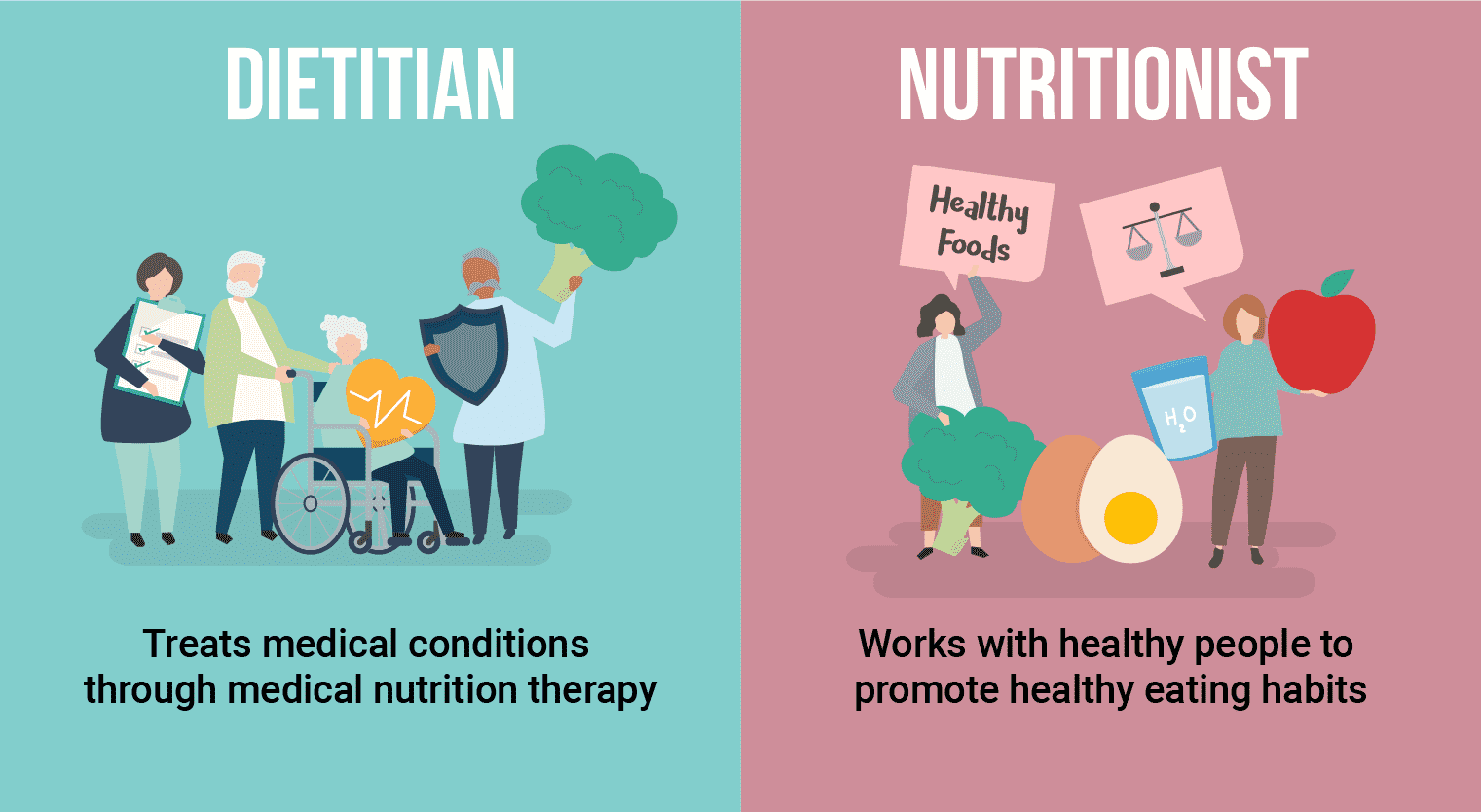
What is a Nutritionist?

A nutritionist is an individual who offers guidance to others regarding their dietary choices to support a healthy lifestyle or attain particular health-related objectives, such as weight loss or blood pressure reduction.
While many nutritionists operate within the confines of hospitals, nursing homes, long-term care facilities, or medical practices, you can also encounter them in various other environments. The qualifications, certifications, or licensure necessary for a nutritionist's practice may vary depending on the state in which they work. However, it's worth noting that in certain states, there are no specific requirements, allowing anyone to adopt the title of a nutritionist without formal qualifications or credentials.
According to BLS, there are approximately 8,401 nutritionists employed in the United States. Among these professionals, approximately 84.2% are women, while the remaining 15.8% are men.
What Is A Nutritionist's Primary Responsibilities?

A nutritionist's primary responsibilities typically revolve around helping individuals and groups make informed dietary choices to support their health and well-being. While the specific duties can vary depending on their specialization and work setting, here are some common primary responsibilities of nutritionists:
- Assessment: Conduct comprehensive assessments of individuals' dietary habits, nutritional status, and health goals. This often involves gathering information about medical history, lifestyle, and dietary preferences.
- Nutritional Counseling: Provide personalized nutrition counseling and education to clients or patients based on their unique needs and goals. This may include creating customized meal plans and dietary recommendations.
- Goal Setting: Collaborate with clients to set achievable nutrition and health goals. These goals may range from weight management and chronic disease prevention to sports performance optimization.
- Dietary Planning: Develop and implement dietary plans that align with specific health objectives, such as managing diabetes, reducing cholesterol levels, or addressing food allergies.
- Monitoring Progress: Continuously monitor and evaluate clients' progress toward their nutritional goals. Adjust dietary recommendations as necessary to ensure effectiveness.
- Nutritional Support: Provide support and guidance to individuals dealing with medical conditions that require dietary modifications, such as celiac disease, lactose intolerance, or eating disorders.
- Public Health Initiatives: Collaborate with public health agencies or organizations to develop and implement community-based nutrition programs and interventions.
- Documentation: Maintain detailed records of client assessments, progress, and dietary plans to track and evaluate the effectiveness of interventions.
- Communication: Effectively communicate with healthcare teams, including doctors, nurses, and other healthcare professionals, to ensure coordinated care for patients with specific dietary needs.
It's important to note that the specific responsibilities of a nutritionist can vary depending on their area of specialization (e.g., clinical nutritionist, sports nutritionist, pediatric nutritionist) and the setting in which they practice (e.g., hospitals, private practice, schools, community health centers).
All Types of Nutritionists: Salary, Jobs, Skills, Active Practitioners in 2023
The field of nutrition is diverse, with professionals specializing in various areas. These nutritionists have a wide range of educational backgrounds and expertise levels, which can influence the scope of their practice. Here's an overview of the various types of nutritionists worldwide, highlighting their roles, skills, salary, etc.
1. Clinical Nutrition

Clinical nutritionists operate in both inpatient and outpatient clinical settings. They engage in one-on-one consultations with individuals and their families, focusing on the assessment, design, and implementation of dietary strategies and nutritional therapies. Their primary objective is to address specific medical issues, which can include – Hypertension (High Blood Pressure), Diabetes, Obesity, Medical Treatments (In cases where medical treatments like chemotherapy impact an individual's diet or result in specific food sensitivities), Nutritional Support, etc.
In addition to addressing these specific medical issues, clinical nutritionists take a holistic approach to healthcare. They consider the individual's overall health and well-being, taking into account factors such as age, gender, lifestyle, and dietary preferences to develop comprehensive dietary plans that promote optimal health and recovery.
- Average Salary : In the United States, the typical annual salary for a Clinical Nutritionist averages around $83,842.
- Job Opportunities : The employment outlook for clinical nutritionists is promising, with a projected growth of 7 percent from 2022 to 2032.
- No. of Active Practitioners : There are over 580 Clinical Nutritionists in the United States.
2. Community Nutrition

Source: Eac-network
Community Nutritionists can be found working in a variety of settings, including schools, community health clinics, recreational centers, local, state, and federal government agency programs, and health maintenance organizations (HMOs). In these environments, nutritionists often focus on addressing the unique nutritional needs of specific subgroups, such as children, older individuals, and at-risk families, through tailored programs designed to address specific nutritional issues.
- Average Salary : As of 2023, the average salary for a Community Nutritionist in the United States falls around $49,178. However, salary ranges can vary, with most falling between $42,491 and $57,942.
- Job Opportunities : The projected growth rate for all nutritionists is expected to remain at 7%.
- No. of Active Practitioners : The projected number of Community Nutritionists in the USA is estimated to exceed 500 individuals.
3. Gerontological Nutritionist

A gerontological nutritionist specializes in understanding the impact of nutrition on the elderly population. They typically work in various healthcare settings, such as hospitals, clinics, nursing homes, and community health centers. Their primary role is to offer valuable guidance on the optimal care and nutrition for elderly patients and clients.
For instance, in a nursing home, a gerontological nutritionist may have the responsibility of developing comprehensive meal plans that cater to the nutritional requirements of the entire elderly population. Additionally, they provide specialized care, crafting individualized nutrition plans for elderly patients with specific health needs, ensuring they receive the proper dietary support for their well-being.
- Average Salary : The average salary for a gerontological nutritionist is $54,220.
- Job Opportunities : Jobs in this specialty are expected to grow at an average rate of approximately 12% by 2022.
- No. of Active Practitioners : N/A
4. Animal Nutritionist

Animal nutritionists specialize in formulating diets that provide essential nutrients for various animals. They often work for pet food companies, helping develop nutritious products. They also consult with institutions caring for animals, like zoos, wildlife reserves, and farms, to ensure animals receive proper nutrition. In private practice, veterinarians may hire animal nutritionists to advise on the dietary needs of individual pets, especially when addressing specific health concerns or conditions.
Animal nutritionists contribute significantly to the health and well-being of animals across diverse settings, from household pets to those in conservation and agriculture.
- Average Salary : The average Animal Nutritionist salary in the United States is $78,175.
- Job Opportunities : Job availability for animal nutritionists is anticipated to increase at a rate of 9% from 2020 to 2030.
- No. of Active Practitioners : According to the American College of Veterinary Nutrition, there are nearly 100 animal nutritionists in the United States.
5. Management Nutritionist

Nutritionists in management roles are frequently hired by large corporations and institutions responsible for providing food to employees or the public. Their primary focus is on creating efficient and cost-effective meal plans that meet the nutritional requirements of large groups while aligning with the company's dietary standards. These professionals often manage various aspects of food operations, including sourcing, quality testing, and budgeting, to ensure the delivery of nutritious meals.
- Average Salary : The average annual salary for a Management Nutritionist in the United States is approximately $79,170.
- Job Opportunities : Employment opportunities for management nutritionists are expected to increase by 7 percent from 2022 to 2028.
- No. of Active Practitioners : N/A
6. Public Health Nutritionist

Public health nutritionists play a crucial role in educating the public about nutrition through classes, workshops, and counseling sessions. Their main focus is collaborating with community organizations or local governments to offer resources to individuals, particularly those with limited income or engaged in high-risk occupations, to help them maintain healthy lifestyles within their means. Additionally, public health nutritionists may engage in advocacy efforts to promote a deeper understanding of nutrition within government regulations.
- Average Salary : Public health nutritionists typically earn an average annual salary of around $53,000.
- Job Opportunities : The demand for public health nutritionists is expected to increase significantly, with a projected growth rate of 20% over the next several years.
- No. of Active Practitioners : According to the Association of State Public Health Nutritionists (ASPHN), they currently have a membership base exceeding 100 individuals.
Buy 100% Opt-In Healthcare Speciality Lists
- Physician Email List
- Dentists Mailing List
- Surgeons Email Database
- Doctors Email List
- Hospital Mailing List
- Cardiologist Email List
- Nurses Contact List
- Primary Care Physician Email List
- Pharmacist Email Database
- Veterinarian Mailing List
- Pediatrician Contact List
- ENT Specialist Mailing Database
- Neurologist Email Addresses
Contact Us for Marketing Campaigns
7. Pediatric Nutritionist

Pediatric nutritionists are dedicated to promoting the best possible nutritional health for infants, children, and adolescents. Registered dietitians can pursue specialized certification as a Specialist in Pediatric Nutrition through the Commission on Dietetic Registration. This certification recognizes their expertise in providing tailored nutritional guidance to young individuals at various stages of development.
- Average Salary : The average salary for a Pediatric Nutritionist in the United States is approximately $63,792.
- Job Opportunities : The field of pediatric nutrition is showing consistent growth year by year, signaling an increasing demand for this specialized expertise. The requirement for additional education and training underscores the expectation that pediatric nutritionists will remain in high demand for the foreseeable future.
- No. of Active Practitioners : There are more than 205 Pediatric Nutritionists practicing in the United States.
8. Sports Nutritionist

Sports nutritionists are crucial in optimizing the performance of athletes and active adults. These professionals, often known as sports dietitians, are in high demand for designing customized nutrition and hydration programs tailored to individual athletes or teams. A noteworthy credential for sports nutrition experts is the "Board Certified Specialist in Sports Dietetics." This certification highlights their specialized knowledge in the field of sports nutrition.
Additionally, sports nutritionists may operate in gyms, fitness centers, or sports clinics, where they offer guidance to active individuals, helping them understand nutrition and craft diets that align with their personal health objectives and athletic aspirations.
- Average Salary : The average salary for a Sports Nutritionist in the United States is approximately $57,684.
- Job Opportunities : According to the U.S. Bureau of Labor Statistics, all sports nutritionists can anticipate a 16% growth rate in demand for their skills.
- No. of Active Practitioners : In the United States, there are over 148 Sports Nutritionists, and approximately 8.3% of them identify as Black or African American.
9. Holistic Nutritionist

Holistic nutritionists concentrate on the interplay of the mind, body, and spiritual aspects in shaping an individual's health. Their scope often expands beyond conventional food nutrition to encompass various facets of a client's lifestyle. These practitioners may work with private clients or organizations seeking holistic guidance that goes beyond standard government or health organization nutrition guidelines. Their approach takes into account the holistic well-being of individuals, emphasizing the interconnectedness of physical, mental, and spiritual health.
- Average Salary : The average salary for a Holistic Nutritionist in the United States is approximately $55,485 per year, which translates to an hourly rate of about $27.
- Job Opportunities : Holistic Nutritionists are experiencing a growth rate of 6.6%, which is faster than the national average for all jobs.
- No. of Active Practitioners : In the United States, there are more than 84 recorded holistic nutritionists.
10. Renal or Nephrology Nutritionist

Renal or nephrology nutritionists specialize in providing diet therapy for individuals with chronic kidney disease (CKD), a condition characterized by the gradual decline in kidney function. These professionals play a vital role in assessing and delivering personalized medical nutrition therapy (MNT) tailored to the unique dietary needs of individuals with CKD.
The National Institute of Diabetes and Digestive and Kidney Diseases underscores the importance of MNT in CKD management. It can effectively delay the progression of CKD, address complications like malnutrition, and enhance the quality of life for those affected. Furthermore, MNT has the potential to reduce healthcare costs associated with CKD care.
- Average Salary : The salary range for a Renal or Nephrology Nutritionist's job in the United States typically falls between $47,650 and $66,719 per year.
- Job Opportunities : The employment outlook for Renal or Nephrology Nutritionists is expected to grow by 7 percent from 2022 to 2032.
- No. of Active Practitioners : N/A
11. Registered Dietitian Nutritionist

Dietitian nutritionists specialize in the field of nutrition and have fulfilled the educational and credential prerequisites to become licensed dietitians. They are defined by a series of criteria, starting with the completion of a bachelor's degree with coursework accredited by the ACEND.
Beyond academics, they have undergone practical training, accumulating a specific number of supervised fieldwork hours to gain valuable hands-on experience.
- Average Salary : The average salary for dietitians is approximately $62,500 per year or $30.05 per hour. Entry-level positions typically start at around $55,449 per year, while experienced workers in this field can earn up to $78,004 per year.
- Job Opportunities : The employment prospects for registered dietitians are expected to grow by 7 percent from 2022 to 2032. This growth rate is faster than the average for all occupations, indicating a strong demand for their specialized expertise in nutrition and dietary counseling.
- No. of Active Practitioners : There are currently over 31,895 registered dietitians employed in the United States.
12. Nutrition Consultant

A nutrition consultant is an individual who provides nutrition-related advice and guidance but may not have fulfilled the educational or licensing prerequisites of a certified nutritionist. To become a nutrition consultant, one can typically hold a high school diploma or GED and pursue credentialing through organizations like the American Association of Nutrition Consultants. Many nutrition consultants operate within the realm of private consulting or health coaching, offering their expertise to clients seeking nutritional guidance and support.
- Average Salary : The average salary for a Nutrition Consultant in the United States is approximately $55,497 per year.
- Job Opportunities : The job outlook for Nutritional Consultants is projected to increase by 11 percent from 2018 to 2028.
- No. of Active Practitioners : Currently, there are more than 3,789 nutritional consultants employed in the United States.
Is Nutritionist and Dietitian the Same?
The terms "nutritionist" and "dietitian" are often used interchangeably, but they can have different meanings and implications depending on the region and the individual's qualifications.
In some places, there is no legal distinction between the two terms, and both nutritionists and dietitians may have similar education and training. However, in many countries, including the United States, Canada, and some European countries, there are legal distinctions:

Source: Eduadvisor
- Dietitian : A dietitian is a regulated healthcare professional who typically holds a bachelor's degree in dietetics or a related field, has completed supervised practice (internship), and has passed a national exam. Dietitians often work in clinical settings, hospitals, healthcare facilities, and private practice. They are qualified to provide medical nutrition therapy and dietary counseling for a wide range of health conditions.
- Nutritionist : The term "nutritionist" is more broadly used and may not be regulated in some regions. In some cases, individuals may use the title "nutritionist" without specific education or credentials. However, some nutritionists also hold advanced degrees and certifications in nutrition-related fields and may have expertise in specific areas of nutrition.
It's important to check the qualifications and credentials of a nutrition professional when seeking their services. In regions where there is no legal distinction between the terms, the qualifications, education, and experience of the individual are critical factors to consider when choosing a nutrition expert. In regulated areas, dietitians are often seen as the gold standard for clinical and medical nutrition advice due to their extensive training and credentials.
How To Become A Nutritionist: Education And Oversight?

In the field of nutrition, it's essential to understand that there is significant variation in regulation and qualifications among professionals. Unlike dietitians, nutritionists typically encounter less strict regulation, which means that individuals without formal training can legally use the title "nutritionist." However, many nutritionists opt to pursue advanced education and certification to demonstrate their expertise.
One pathway for nutritionists to obtain a recognized credential is by becoming a Certified Nutrition Specialist (CNS) through the Certification Board for Nutrition Specialists (CBNS). To qualify for this certification, applicants typically need a masters degree in nutrition or a related field, along with a minimum of 1,000 hours of practical experience. Only those who pass the CBNS exam and meet these requirements can legally use the designation CNS after their names.
Another organization, the Clinical Nutrition Certification Board, offers certification as a Certified Clinical Nutritionist (CCN) for qualified professionals.
In contrast, the path to becoming a registered dietitian (RD) or registered dietitian nutritionist (RDN) involves more comprehensive requirements, including a bachelor's degree in nutrition or a related field with approved coursework, at least 1,200 hours of supervised experience in various healthcare settings, and successfully passing a national exam administered by the Commission on Dietetic Registration. Furthermore, registered dietitians must fulfill annual continuing education requirements to maintain their board certification. The key distinction is that registered dietitians carry the titles RD or RDN after their names, signifying their completion of the rigorous educational and credentialing process.
Wrap-Up
In summation, the field of nutrition boasts a diverse array of professionals, each with unique expertise and roles tailored to address specific dietary needs and health objectives. We've explored various types of nutritionists, ranging from clinical nutritionists who work closely with individuals in healthcare settings to sports nutritionists dedicated to enhancing athletic performance. Each type of nutritionist is crucial in promoting well-being, addressing dietary concerns, and enhancing the overall quality of life for diverse populations.
As the field of nutrition continues to evolve and our understanding of the profound impact of diet on health deepens, these nutrition professionals remain committed to helping individuals achieve their nutritional goals, maintain optimal health, and embrace a balanced and nourishing approach to life.



